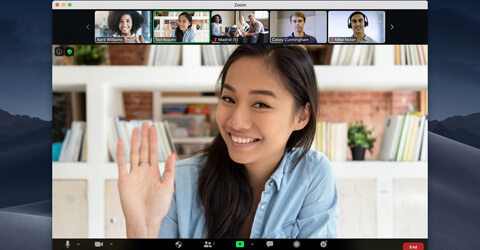Eric Yuan is the Founder of the exceptional Zoom app. Under Yuan’s commendable leadership, Zoom was one of the highest-performing tech IPOs of 2019. He was given the title of one of the ‘Most Powerful People in Enterprise Tech’ by Business Insider. In 2018, he was also named the ‘#1 CEO of a Large US Company’ by Glassdoor and ‘EY Entrepreneur of the Year’ in Northern California in the Software Category.
Amid the coronavirus pandemic, we all found ourselves stranded at home and forced to work remotely. In our quest to find good apps for video conferences, Zoom emerged as a beacon of hope for all of us. A lifesaver indeed!
So how did this brand emerge?
Mr Yuan, a Chinese born software engineer started Zoom in 2011. He got the idea of starting Zoom during his college years in China. He had to travel a long distance to meet his then-girlfriend and now wife, according to Forbes. “ I was only able to see her twice a year and it took more than 10 hours to get there by train. I was young then—18 or 19 years old—and I thought it would be fantastic if in the future there was a device where I could just click a button and see her and talk to her.
Yuan then decided to come to the U.S. in the mid-’90s because of the Internet, which he knew would be a big hit. However, his Visa application kept getting rejected but Yuan continued trying with due diligence for two years till he was finally successful on his 9th attempt.
He arrived in Silicon Valley in 1997 and joined WebEx. In 2007 WebEx was acquired by Cisco and Yuan was promoted to the ranks of Corporate VP of engineering. He often met with the customers and learnt they weren’t very happy with the current collaboration solutions, including WebEx.
Yuan revealed in an interview, “I firmly believed I could develop a platform that would make customers happy, so in June of 2011, I decided it was time to make the video communications solution I imagined during my college train trips a reality. More than 40 fellow engineers followed me in my new venture. We launched the Zoom platform in 2012. Now, a little more than five years later, we’ve hosted over 20 billion annualized meeting minutes (up from 6.9B last year) and our customer base includes 1/3 of the Fortune 500 and 90 per cent of the top 200 U.S. universities”
At the time, he faced doubts from many investors, who did not see the need for another option in a market already dominated by big players such as Microsoft and Cisco. Yuan left a 6 figure well-paying job to follow his passion but the risk definitely paid off despite all the struggles he had to endure. His motto, Hard work and stay humble kept him motivated through it all.
“During the early stages of Zoom, I personally emailed every customer who cancelled our service,” Yuan said in an interview with Thrive Global in 2017. “One customer replied to my note and accused me of sending auto-generated emails “impersonating” the CEO — he said Zoom was a dishonest company! I wrote back that the email was indeed from me, and that it wasn’t generated by one of our marketing tools. He still didn’t believe me, so I wrote back again and offered to meet him on a Zoom call right that minute to prove it was me writing the emails. That call never did take place, but he stopped accusing Zoom of being dishonest!”
However, through it all Zoom emerged victoriously. It had one of the most successful IPO’s in the World that increased the company’s worth to more than both Lyft and Pinterest, according to The Financial Times.
The pandemic gave Zoom a golden ticket, forcing millions of people to work remotely and turn to video conferencing apps in 2020. During the first three months of the pandemic, Zoom’s sales nearly doubled in volume. Yuan has now amassed a fortune of over $17 billion, according to the Bloomberg Billionaires Index. He now officially ranks on the Forbes 400, making him one of the richest people in the US.
Yuan feels there’s still plenty of room for the company to grow. His vision for Zoom is to reach over a billion individual users one day.
“There are over 1 billion [office] workers worldwide,” he tells CNBC Make It. “Our goal is to connect all those 1 billion knowledge workers with the Zoom platform. So, given where we are now … I would think we literally just started.”







